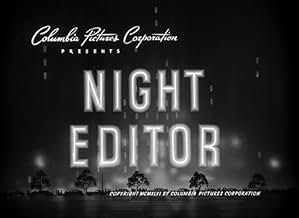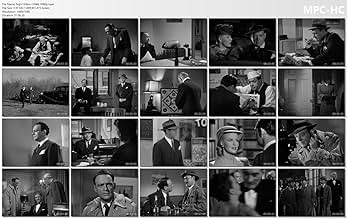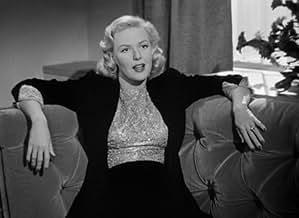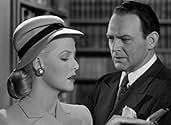Ajouter une intrigue dans votre langueA detective's dilemma. A murder investigation is compromised by the detective's compromised position in love.A detective's dilemma. A murder investigation is compromised by the detective's compromised position in love.A detective's dilemma. A murder investigation is compromised by the detective's compromised position in love.
- Réalisation
- Scénario
- Casting principal
- Doc Cochrane
- (as Robert Stevens)
- Boy
- (non crédité)
- Tusco
- (non crédité)
- Dickstein
- (non crédité)
- Doc Cochrane as a Boy
- (non crédité)
- District Attorney Bill Halloran
- (non crédité)
- Fat Man in Library
- (non crédité)
- Reporter
- (non crédité)
- Benjamin Merrill
- (non crédité)
Avis à la une
This film version, very tightly directed by Henry Levin, and starring the then aging and rumpled William Gargan, is a definite Noir artifact of the late 1940's.
There's little pity in this compact story of sex and brutality. Unusual for a film of this time period, the femme fatale is depicted as a woman who feeds on cruelty and takes gleeful joy in looking at the battered corpse of one of her previous friends. Murder and perversion seem to function as the only things she truly loves. They are what she demands others give her so she may feed the bottomless emptiness within.
Originally fashioned as a pilot episode for a new continuing series like its radio show progenitor, the film was a failure upon release, but succeeds as a stand alone example of the close ties between sex and sadism in the continuing Noir cycle.
"You are just no good for me. We both add up to zero"
A raging "B" pic out of Columbia? Absolutely! This is something of a film noir lovers delight. There is no getting away from the fact it has one of those endings that has proved to be divisive, so how it stacks up for first time viewers now may make or break your opinion of it...
Story finds copper Tony Cochrane (Gargan) having a love affair with viper like Jill Merrill (Carter), this in spite of the fact he has a gorgeous loving wife and a son who worships him. During one of the illicit couple's love trysts they witness a violent murder, and fearing scandal Cochrane fails to uphold the law. From such decisions does life often spiral out of control...
Okies. So we got hot and sweaty scenes, flashbacks, wet streets lit by lamps, alleyways, barely lighted rooms - particularly the station offices - symbolic and metaphorical sequences (oh my those crashing waves), but it's the barbed dialogue, the blend of sex and violence, and a femme fatale of considerable greatness, that ultimately makes this soar.
Personally I hate the ending, but as stated before, I do know noir lovers who find it cheeky and enjoyable. Yet even with my irritation at the finale - and of Carter's hair style (which pushes Phyllis Dietrichson for most unflattering look), there's just so much good here for noir lovers not to enjoy greatly. 7.5/10
In flashback, the editor tells the tale of police lieutenant Tony Cochrane (William Gargan), a family man who cheats on his wife with socialite femme fatale Jill Merrill (Janis Carter). Cochrane and the woman, who is also cheating on her husband, witness a man bludgeoning his girlfriend to death with a tire iron while the couple is parked at "lovers lane" by the beach.
The two can't report the crime without revealing their cheating, a dilemma which eventually leads to bigger troubles. Meanwhile, Cochrane must investigate the killing but is not able to tell anyone he witnessed the crime.
This movie was supposed to be the first in a series of Night Editor movies, but it's the only one that was ever made.
It's definitely Film Noir (I've been watching quite a few so called Film Noir movies and many just aren't. This is a fairy good example of the genre, although it sure is "talkie." I would have preferred some more action.
A lot more action. On the plus side, it's a really short film. I guess it was part of a two feature showing.
On a newspaper night shift, the people in the newsroom are told the story of Tony Cochrane, a police officer. This was the first in a planned series of night editor stories, which never happened.
Tony was a married man cheating on his wife (Jeff Donnell) with a married socialite, Jill Merrill (Janis Carter). One night, they're parking down by the beach, and they see a man beat a woman and run away. They both see his face clearly. Tony could have apprehended the man, and perhaps even stopped the murder (though it seemed to have happened very quickly) but he was afraid of being found out and losing his wife, son, and his job.
When the murder is reported, Tony has to investigate, not letting on that he was a witness. By now he's broken things off with Jill. He's surprised to see her name on a list of the dead woman's friends. He confronts her, because he suspects she recognized the man, but she won't tell him the man's identity. Things go from bad to worse.
This was pretty good and effective, with a nice ending. Gargan by then wasn't anyone's idea of a leading man, but was a good playing a cop. Gargan had a laryngectomy in 1960, after which he devoted his time to the American Cancer Society and used a voice box.
Janis Carter is a glamorous femme fatale here and plays a woman devoid of any conscience or compassion. In fact, when she learns the dead woman's face had been bashed in, she wants to see it. The idea is, she's married to an older rich man and likes slumming.
I wasn't expecting much from this two-noir disc from Netflix, but I would up liking both of them.
My guess is Night Editor was hoping to repeat the success of the noirish Whistler series, also adapted from radio. It didn't happen, but not because of a failure in this 60-minutes. Sure, it wraps up in conventional fashion, even if imaginatively done. After all, there was a stultifying Production Code in effect. Still, the other 55-minutes amounts to a nail-biting trip down black shadow lane. Actor Gargan may not show much emotion as the conflicted cop. But then he's got to keep his real feelings inside. Otherwise he might give it all away, which includes not just his job but wife and family, as well. So, how did he get mixed up with the blonde man-eater in the first place. Apparently it was from working on a prior case that involved Jill and her ritzy clueless husband. It appears she sets a mean trap for about every guy crossing her predatory path, including bank presidents.
No doubt about it, Jill's on the very edge of 40's perversity. Carter really looks the part of blonde ice-queen, even if nuance is not her strong point. I was hoping for some big-eye close-ups that made her similar role in Framed (1947) so memorable, but director Levin's camera stays mainly at a neutral distance. On the whole, it's the script and dark material that carry events.
Anyway, this early noir is a neglected must-see. I'm not going to say gem, since it doesn't quite rise to that level. Still, for sheer 1940's daring, Harold Smith's crafty little screenplay remains an eye-opener.
Le saviez-vous
- AnecdotesThe car the murderer uses is a rare 1933 Packard Standard Eight Coupe Roadster. In excellent condition in 2020 this car could sell for well over $100,000.
- GaffesAlthough the majority of the movie is a prolonged flashback set in the early 1930s, absolutely everything (with the exception of a few vintage cars) - hairstyles, wardrobe, music and decor, is strictly contemporary 1946, without the slightest attempt at accuracy.
- Citations
Jill Merrill: I don't need you, I can buy and sell you.I don't know why I bother seeing you.
Tony Cochrane: You don't know why? I'll tell you. You're rotten rich through and through.Like something they serve at the Ritz,only its been laying out in the sun too long.
Jill Merrill: That's right, Tony, you're not my kind. The clean cut type.Little tootsie-wootsie loves her great big stupid peasant.
Tony Cochrane: Yeah, for all your dough, like a ton of bricks!
Jill Merrill: How picturesque. And you were totally unresponsive?
Tony Cochrane: You're like a sickness. I was sick!
Jill Merrill: No, Tony it was a fever!
Tony Cochrane: Its a nightmare! With convulsions!
- ConnexionsSpin-off Night Editor (1952)
Meilleurs choix
- How long is Night Editor?Alimenté par Alexa
Détails
- Durée
- 1h 8min(68 min)
- Couleur
- Rapport de forme
- 1.37 : 1

































